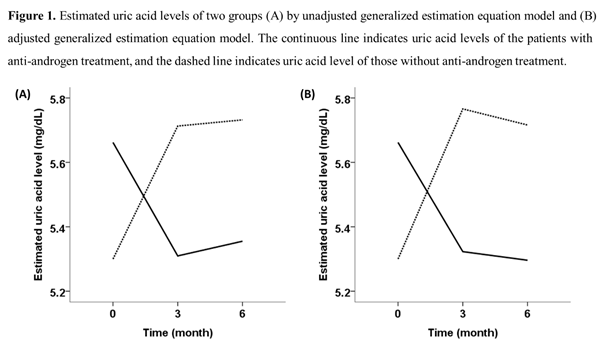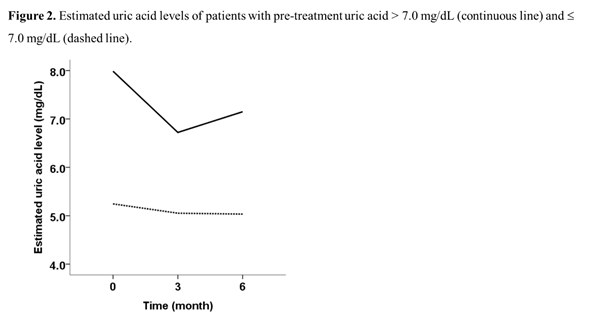Session Information
Date: Tuesday, November 15, 2016
Title: Metabolic and Crystal Arthropathies - Poster II: Epidemiology and Mechanisms of Disease
Session Type: ACR Poster Session C
Session Time: 9:00AM-11:00AM
Background/Purpose: The prevalence of hyperuricemia and gout suggests that sex hormones play a role in the gender difference with gout. Estrogen has been thought to reduce serum uric acid levels by increasing renal urate elimination. However, studies on the relationship between testosterone and uric acid levels showed conflicting results. We performed this study to define whether anti-androgen treatment affects serum uric acid levels in men.
Methods: This retrospective study reviewed the medical records of 178 patients who underwent anti-androgen treatment for advanced prostate cancer from January 2004 to December 2013 at Seoul National University Bundang Hospital. We enrolled 92 patients with available pre- and post-treatment (3 or 6-month) uric acid levels among them. An age-matched control included 46 prostate cancer patients who underwent surgical treatment only and had available pre- and post-treatment uric acid levels. The change of serum uric acid levels was compared by generalized estimation equation (GEE) model between patients with and without anti-androgen treatment.
Results: Compared to the control group, patients with anti-androgen treatment showed a more pronounced reduction of uric acid levels at both 3 and 6 months (estimation = -0.765 at 3-month and -0.739 at 6-month after anti-androgen treatment, both p-value < 0.001, Figure 1A). After further adjusting with hemoglobin, blood urea nitrogen, serum creatinine and serum protein levels, the difference was still significant (estimation = -0.831 at 3-month and -0.766 at 6-month, both p-value < 0.001, Figure 1B). When patients were stratified according to pre-treatment uric acid level (uric acid > 7 mg/dL versus <= 7 mg/dL), patients with hyperuricemia showed a more decrease in uric acid levels at 3-month compared to those with normouricemia (estimation = -1.072, p < 0.001, Figure 2).
Conclusion: These results showed that serum uric acid levels significantly decreased after anti-androgen therapy and suggest that male sex hormone could partially explain the gender difference in gout and hyperuricemia prevalence.
Keywords: Uric acid, hyperuricemia, gout, anti-androgen treatment
To cite this abstract in AMA style:
Lee JH, Park EH, Chung SW, Hur J, Ha YJ, Song YW, Lee YJ. The Influence of Androgen Deprivation Therapy on Serum Uric Acid Level [abstract]. Arthritis Rheumatol. 2016; 68 (suppl 10). https://acrabstracts.org/abstract/the-influence-of-androgen-deprivation-therapy-on-serum-uric-acid-level/. Accessed .« Back to 2016 ACR/ARHP Annual Meeting
ACR Meeting Abstracts - https://acrabstracts.org/abstract/the-influence-of-androgen-deprivation-therapy-on-serum-uric-acid-level/



